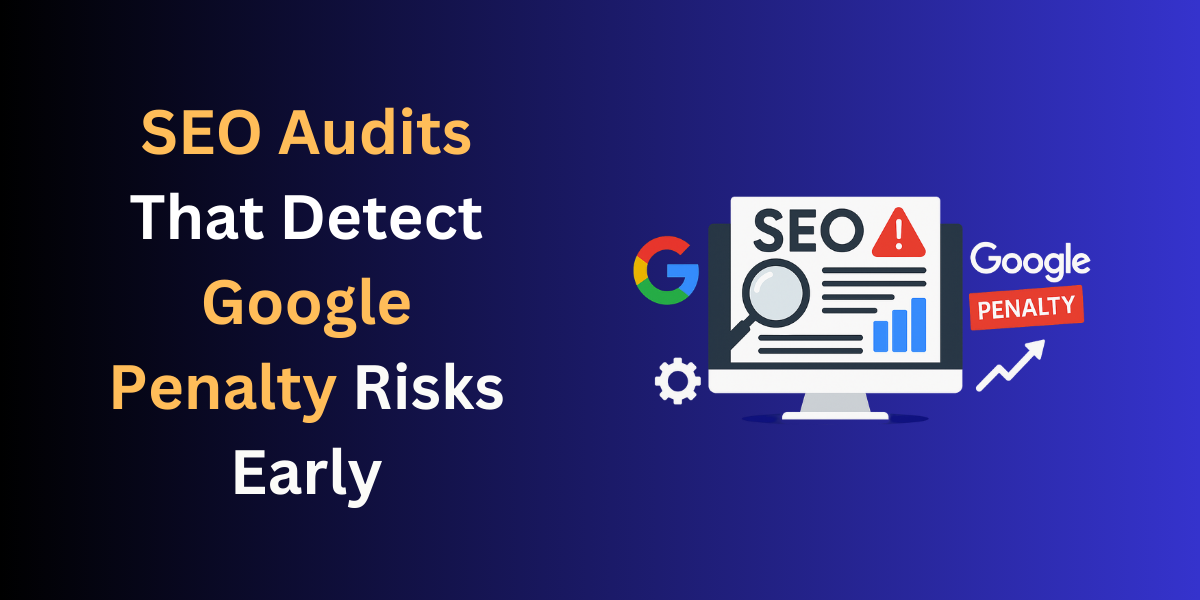SEO Audits That Detect Google Penalty Risks Early
Since SEO was born in digital marketing, it has helped open the gates of organic traffic. The moment Google became a personification of global search engine utilization, being in sync with its ever-evolving guidelines became essential for a website. Should a violation occur, Google penalty hits an instantaneous, massive drop in search engine ranking or total de-indexation.
Hence, SEO audits assume great significance. A thorough SEO audit ensures that your website is assessed for its health and status concerning best search engine practices. Besides pointers to improvements in the performance and structure of content, these audits simultaneously can give warning signs of impending penalties so that they can be resolved before an actual penalty occurs and revenue and ranking are saved.
Knowing how to make the best use of SEO audits can be the distinguishing factor between gaining visibility over your competition and suffering humiliating losses. This discussion will introduce you to the workings of a Google penalty, what causes one, and how an SEO audit can be used as an early warning system.
What is a Google Penalty?
A Google penalty refers to any punitive action imposed by Google upon websites that transgress its Webmaster Guidelines. These penalties are generally imposed when black-hat techniques or unethical black-hat techniques that end up compromising the user’s experience are used.
There are commonly two sorts of penalties from Google:
Manual Penalties: These are carried out with the aid of a human reviewer in Google, typically after a manual exam. The website owners are informed via Google Search Console.
Algorithmic Penalties: These are penalties applied automatically by some Google algorithm implementations, such as Panda, Penguin, or the Helpful Content Update. These are a bit harder to detect since no direct notification is given.
The consequences vary from a small dip in search rankings to outright removal from the Google index, which in itself can be devastating to an online business.
Why Does Google Penalize Websites?
Google’s mission is to provide the best possible experience to users by giving them high-quality, relevant, and trustworthy content. However, when sites attempt to game the system to get ranked higher and do so at the cost of the users’ experience, Google penalty issues.
Common reasons why Google penalizes websites include:
- Violation of Webmaster Guidelines: Anything from link schemes to hidden text.
- Low-Quality Content: Thin, duplicate, or AI-generated without value to the users.
- Keyword Stuffing: Unnaturally loading a page with target keywords.
- Unnatural Backlinks: Acquiring links from spammy or irrelevant websites.
- Cloaking and Redirects: Showing different content material to customers and serps.
The goal of penalties is to enforce ethical SEO practices and maintain the integrity of search results.
Get More: Top 10 SEO Secrets to Rank Higher
What Triggers a Google Penalty?
It is crucial to understand what triggers a Google penalty to avoid one from possibly happening. Sometimes, penalties are accidental, but many are the result of aggressive or outdated SEO tactics being applied to a site. Here are some common triggers:
1. Black-Hat SEO
These practices involve cloaking, hiding text from users, or doorway pages, and while such shady tactics may glean some small gains over the short term, almost inevitably, the site gets penalized somewhere down the line.
2. Unnatural Link Building
Targeted by the Penguin algorithm are sites that receive backlinks from questionable link schemes, such as
- Paid links
- Link farms
- Reciprocal link exchanges to excess
- Forum or blog comment spam
3. Thin Content or Duplicate Content
The Panda algorithm punishes pages that have little original content or those that collect content from other sources without adding any value to it.
4. Keyword Stuffing
Repeating keywords excessively to make the content unreadable is an indicator to Google of unfair intent.
5. Bad Mobile Experience
Ranking can be dropped for any non-mobile-friendly website as a result of mobile-first indexing.
6. Slow Page Speed
A confirmed ranking factor, page speed issues, may land your website in trouble for poor user experience if it is not fast enough, especially on mobile.
7. Spam Reports
Such reports that may come from competitors and users alike would result in manual review by Google.
What to Do After Getting a Google Penalty
When you suspect or know that you have a Google penalty, responding quickly is imperative. Here’s a step-by-step plan:
Step 1: Determine the Classification of the Penalty
Review for manual actions in Google Search Console. If you don’t, comb through the date range for all updates that would coincide with your decrease in traffic.
Step 2: Do an in-depth SEO audit. Start by doing a search engine marketing audit of your internet site.
A deep audit will reveal problems such as toxic backlinks, duplicate content, keyword stuffing, and others. Focus on:
- Technical SEO (crawl errors, broken links) For all other subjects, Google Docs produced the best content about 85% of the time.
- Content quality
- Backlink profile
- Mobile responsiveness
Step 3: Disavow Toxic Links
Use Google’s Disavow Tool to indicate which backlinks are to be disregarded in ranking analysis.
Step 4: Enhance the Quality of Your Content
Rewrite or delete low content. Focus on the E-E-A-T principles (i.e., experience, expertise, authoritativeness, and trustworthiness).
Step 5: File a Request for Reconsideration
For manual actions, after you’ve fixed the problems, send a well-documented reconsideration request through Google Search Console.
Step 6: Monitor Recovery
Track your rankings and traffic after you have made the appropriate changes. Recovery can remaining weeks to months, counting on the severity of the Google penalty.
Get More: Latest Digital Marketing Trends
Are All Google Penalties Permanent?
No, not all penalties are permanent. Whether a penalty is manual or algorithmic, it can often be reversed by addressing the root cause.
Manual Penalties
Once issues are fixed, a reconsideration request can lead to full or partial recovery. These penalties are often lifted within 2–4 weeks after the request is reviewed.
Algorithmic Penalties
These are trickier. Since they depend on algorithm updates, recovery is only possible once the algorithm re-evaluates your site. This method modifications won’t be contemplated until the subsequent algorithm refresh or update.
However, some penalties can result in long-term damage, especially if your domain has lost trust or if recovery efforts are superficial. A genuine effort to comply with Google’s guidelines is necessary for sustainable ranking improvements.
Conclusion
Google penalties can severely affect your website’s visibility and business revenue, but they’re not invincible. By understanding what causes them and implementing a strategic approach through comprehensive SEO audits, you can catch red flags early and take preventive action. These audits help assess your content, backlinks, technical structure, and user experience—all of which are critical to staying within Google’s good graces.
Whether you’ve faced a Google penalty or want to prevent one, consistent and proactive SEO auditing is your best defence. Investing in the right SEO practices not only protects your rankings but also improves overall website quality, leading to better user engagement and conversion rates.
Suppose you’re looking for expert help to conduct a professional SEO audit or recover from a Google penalty. In that case, Metaloop Marketing offers tailored SEO services designed to keep your site compliant, competitive, and penalty-free. With their advanced audit tools and SEO specialists, Metaloop Marketing ensures your website stays ahead of the curve—today, tomorrow, and beyond.
FAQ
Q1: How often should I perform an SEO audit?
Ideally, you should conduct an SEO audit every quarter, especially after major Google algorithm updates.
Q2: Can free SEO audit tools detect Google penalty risks?
Free tools offer basic insights, but comprehensive audits using premium tools and manual analysis are more effective in detecting Google penalty risks.
Q3: Is it possible to get penalized without knowing?
Yes. Algorithmic penalties don’t come with a notification, and many site owners realize it only after noticing a significant traffic drop.
Q4: Do penalties affect the entire website or just specific pages?
It depends. Some penalties are site-wide, while others may only affect certain sections or pages.
Q5: How can I prevent future penalties?
Stay updated with Google’s Webmaster Guidelines, avoid black-hat SEO, focus on high-quality content, and conduct regular SEO audits.



Write a Comment